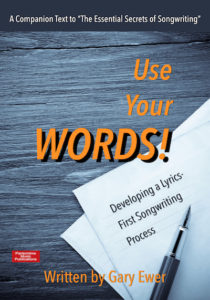You’ve probably noticed that great songwriters, when being interviewed about what they do, often talk about old songs. They’ll talk about the songs of their youth, and sometimes even further back.
If you’re writing songs that you hope are on the cutting edge, songs that you hope sound fresh, new and innovative, it begs the question: what do yesterday’s songs have to do with being excellent writing today’s songs?
 Trying to get a handle on writing song lyrics? Discover the benefits of making a lyrics-first method your new go-to process with”Use Your Words! Developing a Lyrics-First Songwriting Process. It’s FREE right now when you purchase the 10-eBook Bundle.
Trying to get a handle on writing song lyrics? Discover the benefits of making a lyrics-first method your new go-to process with”Use Your Words! Developing a Lyrics-First Songwriting Process. It’s FREE right now when you purchase the 10-eBook Bundle.
Another way of asking this is: If I want to be writing new songs that sound great, shouldn’t I be studying the great new songs that are being released right now?
The Problem With Studying New Songs
There is a potential problem with new songs, which is that they have not had opportunity to stand the test of time. So much of the success we notice in the pop music genres, and the people and bands that perform those songs, is that their public image can be a huge part of their success.
In other words, performers with an enormous following might find that their success comes largely from their image (personal style, character, personality, even clothes) and not so much from the strength of the songs.
And because of that, it’s sometimes the case that when you look at the songs they sing, and consider them apart from the image of the performer, you find they aren’t really great songs. In those cases, the songs often fade from history the same way that the performer fades from history over time.
The Power of Old Songs
Old songs – the ones that have been in the public consciousness for 5, 6 or more decades, have stood the test of time. These songs are the ones that have shown themselves to be strong examples of musical design.
They’re the ones that tend to get covered by many other artists. And because other performers record them, you’ll find that they translate well into different genres.
That one fact — the fact that a song can be sung in many different genres — is one of the best ways of knowing that a song is great.
But if you’re writing new songs, what can you learn from an old one, even a great old one?
Old songs, even ones from the early rock and roll era, share a lot of similarities with new songs:
- Both old and new songs both tend to be mainly love songs.
- Both old and new songs use similar song designs: verse-chorus-bridge, along with optional solos, pre-chorus, and other features.
- Both old and new songs feature fluctuating emotional content: they both use lyrics that raise emotions, then lower them, and do this systematically throughout the song.
- Both old and new songs are short, so the songwriter needs to develop the ability to provide a complete musical journey in a short period of time, usually 4 minutes or less.
- Both old and new songs use many of the same production values and ideas, building and diminishing instrumentation in the same way, using backing vocals in the same way, etc.
There is a lot to be learned from decades-old music. And one other good thing: sometimes bringing back old sounds, even melodic shapes and production ideas that were popular many years ago, can be a great way to create something fresh and innovative.
But even if you’re simply using an old song as an example of greatness, it’s worth the time for today’s songwriters to listen to an oldie but goodie, and ask the simple question: why did this song succeed, and why has it passed the test of time?
Whatever the answer is to that question will probably apply, at least to some degree, to the song you’re writing today.
 Written by Gary Ewer. Follow Gary on Twitter.
Written by Gary Ewer. Follow Gary on Twitter.
 “The Essential Secrets of Songwriting” 10-eBook bundle includes several chord progression eBooks, including “Chord Progression Formulas”. Learn how to create chord progressions within seconds using these formulas.
“The Essential Secrets of Songwriting” 10-eBook bundle includes several chord progression eBooks, including “Chord Progression Formulas”. Learn how to create chord progressions within seconds using these formulas.










